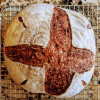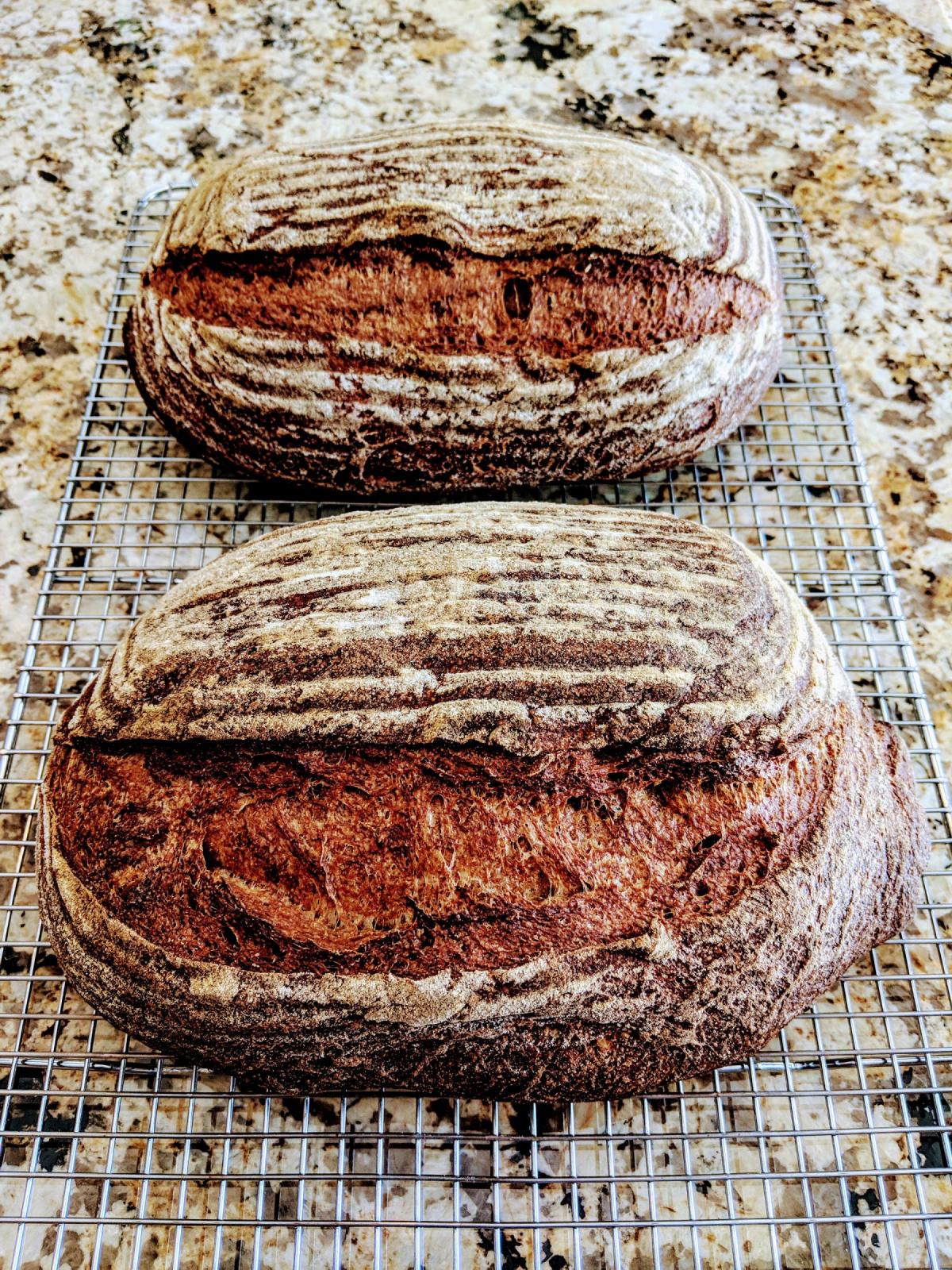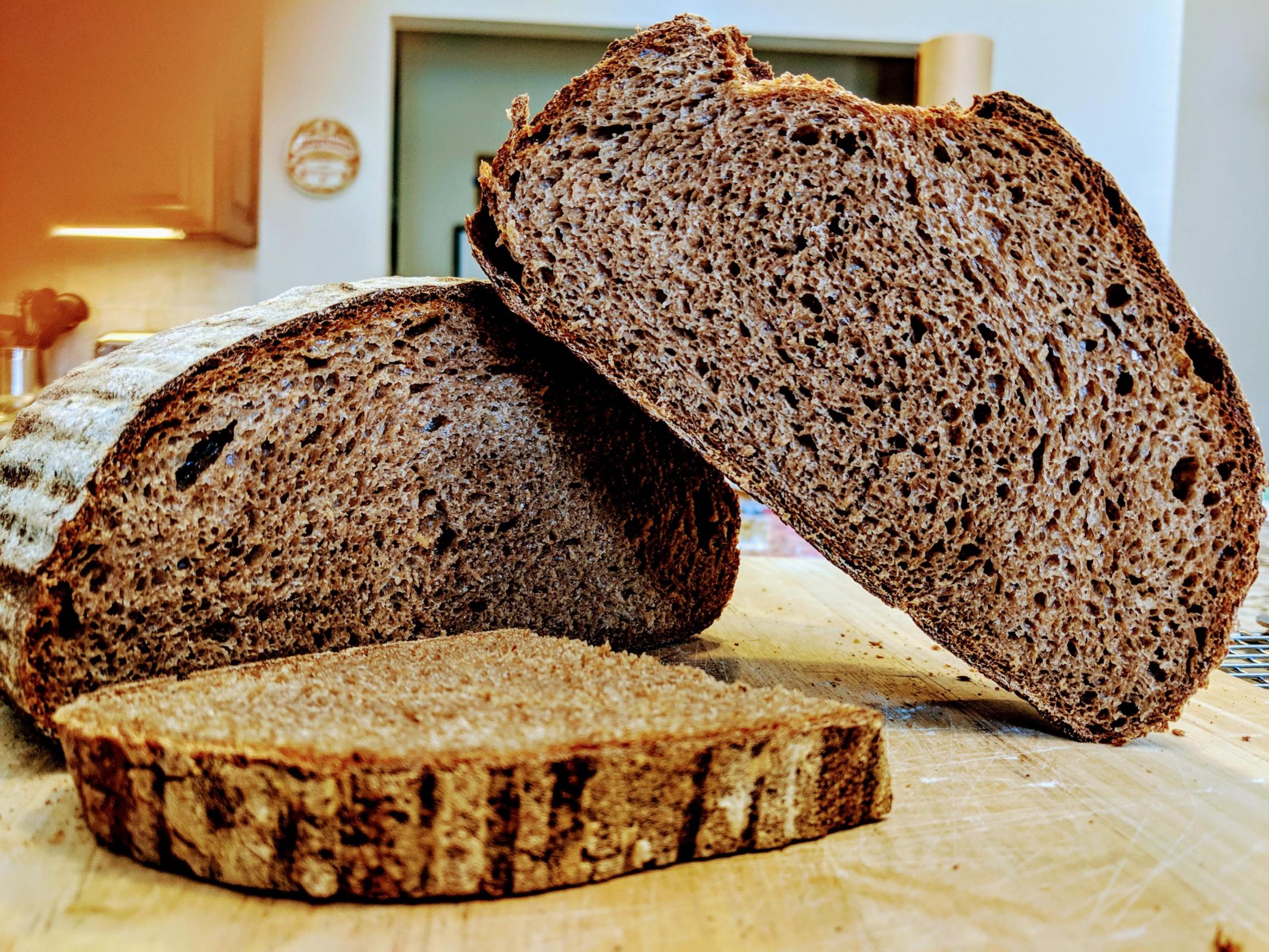
First successful bake from freshly milled flour
After a false start with my new Komo, I got some advice in this forum on tweaks I needed to make working with freshly milled flour.
Well, I did that, and this morning I pulled two respectable bâtards of whole wheat out of my oven:

Crumb shot:

Definitely many problems left to fix, but I'm on the path thanks to this group!
I'm really surprised how vigorous the fermentation is. These loaves are medium sour even though I cut the amount of levain substantially, cut the bulk ferment time, and the overnight proof at 55°F to just ~7 hours (normally it can go as long as 12 hours with store-bought flour).
The crumb is denser than I like so that's my next area of focus. Kneading this dough in the mixer produced no appreciable gluten…after 45 minutes I threw in the towel along with 3¾% vital wheat gluten. :-) After I saw the fermentation was already picking up after an hour into the bulk ferment, I did an accelerated schedule of folding every 20 minutes for two hours to build as much strength as I could, then gave it a half hour rest, preshape, shape, and overnight proof in my wine fridge.
Intense wheat flavor. I was expecting a much more subtle difference, this was night and day, so very surprised and happy about that.
On another note, has anyone tried Wolfgang Mock's muesli with your home mill? I did, it's great! Highly recommend. Just mill a heaping ¼ cup of oat groats on top of a roughly mashed, ripe banana, then cover with milk and stir. Add whatever else you like in your muesli—berries, toasted walnuts, chopped apples—and enjoy. Absolutely delicious.


Very nice work. Freshly milled wheat adds a some very interesting challenges to baking bread but the enhancement of flavor and nutrition are more than enough compensation for mastering them. What wheat were you milling? One thing that I do to enhance gluten development is add 1/4 tsp of Ascorbic Acid to my freshly milled flour and autolyze the flour, Ascorbic Acid and warmed water for 45 minutes to an hour before adding the other ingredients. I mill only the flour I'll need for the loaf I'm baking and start mixing the dough while the flour is still warm from the milling. I'm baking sandwich loaves so I'm not striving for the 'hole-e-grail' of an open, artisanal crumb. Perhaps my gluten development wouldn't be adequate for that type of bread either. You're right about freshly milled flour enhancing fermentation. Creating a new rye starter with freshly milled rye and pineapple juice was incredibly easy and then using it to create another starter with freshly milled hard white wheat was fast as well when compared to working with store bought flours. Congratulations on two fine loaves.
I used Bob's Red Mill hard red spring wheat berries. This was an experiment in response to my first attempt, so I didn't want to change too many things all at once.
I did hear that some home bakers use ascorbic acid when milling their own, but someone pointed me this article at bakerpedia saying the amount is only 0.15g – 0.20g per 10kg flour, which seemed like too little to matter (and they also mentioned that adding too much can be harmful).
I did a nice long 45 minute autolyse with the freshly milled still warm flour, and I also mixed the salt in only just prior to the bulk ferment. I have to wonder if Bob's Red Mill is intended for baking…I haven't seen anyone else mill it and it certainly seems like BRM intends for people to make wheat berry salads or other uses, perhaps that accounts for the lack of gluten.
So I have a ways to go, but I am after that artisanal open crumb. Lots of experimenting left to do!
For certain bakes I use a 1000mg (1 gram) vitamin C tablet for 1 kilo of flour. It is high according to known standards but it makes a remarkable difference in the loaf. That comes to .1% (1 tenth %) of total flour. A vitamin C tablet is almost entirely ascorbic acid and it works well for me. You will see the increased strength in your dough and there is no change in the flavor. If you go the tablet route, they can be easily crushed between 2 spoons.
IMO, the bake and crumb of your bread is excellent.
Dan
A quick calculation using the serving size (45g) and protein content (6g) from the nutrition label of BRM's hard red spring wheat gives 13.33% protein, more than adequate for baking. Perhaps the cost of the berries is one of the primary reasons it isn't milled more often. The organic version works out to $1.99/lb if purchased in 28oz bags using the price listed on the BRM website. Many home millers stockpile wheat. I've got about 100lbs of wheat, rye and corn in the pantry and that cost plus shipping would be prohibitive for me. If you used Hodgson Mills VWG it contains ascorbic acid listed as vitamin C. Keep plugging away at it.